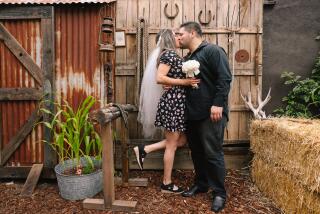Holy Matrimony
For those headed to the altar this summer, the 1999 marital statistics for Orange County are sobering: 19,758 marriages, 12,156 divorces.
And if you’re a religious person, things don’t get better. In fact, for born-again Christians, the divorce rate is higher (27% of all adults) than it is for non-Christians (24%), according to a recent survey by the Barna Research Group.
The picture isn’t rosier for other Christians or Jews. The survey showed their divorce rates about the same as the national average.
There is a ray of marital hope, however. And that comes from the Church of Jesus Christ of Latter-day Saints--specifically, from those Mormons who marry in a temple. While other Mormons divorce at the usual rate, only 6% of those who undergo the demanding temple marriage break up, according to Brigham Young University professor Daniel K. Judd.
It’s not just a question of where the marriage takes place. The low divorce rate, many Mormons say, stems both from church requirements for such marriages and from the character of people who are motivated to meet them.
How do they do it? Let’s count the ways.
1. They date within their faith.
If you date only Mormons, you’ll marry a Mormon. And this translates into a guarantee of shared background, beliefs and values--or one less thing to fight about.
“When we get married, we have one goal and one vision: to create a family,” said Tustin resident Brian Banner, 24, who will be married today at the Mormon temple in San Diego (the other Southern California temple is in Los Angeles). “We believe that it’s something God’s ordained and not something you can walk away from. If something’s wrong, you need to fix it.”
2. They make sure they’re committed to their faith.
The wedding day isn’t the last time Mormon couples see the inside of the temple. As part of the marriage pact, each couple commits to going to services regularly, visiting the temple, tithing and following the church’s strict rules.
“That’s probably the biggest thing [to successful marriages],” said Richard Fuller, president of the Mormon Church’s Newport Coast Branch. “That’s such a bond. It’s very unifying.”
3. They get their lives squared away before marriage.
To be married in the temple--which Mormons believe is holy ground--you need to be “worthy.” In premarital sessions, a local Mormon leader sits down with couples and makes sure they are living by the standards of the church. They are tested on such things as their faith, their relationships with their family, their sexual conduct and their use of drugs, alcohol and tobacco. If they fall short, they can repent, change the behavior and still be married in the temple.
This serves as an early checkpoint for young adult Mormons who may have gotten off course.
“That’s my job,” said Fuller, who specializes in counseling young adults. “I bring people back into the fold. It’s the lost-sheep concept. And they understand that if they don’t get their life in order, they can’t be married in the temple.”
4. They make the wedding ceremony sacred.
You’ll find no bridesmaids, best men or wedding cakes at a temple marriage. It’s a small ceremony with close family and friends, all who have to be in good standing with the church to attend. The bride and groom--both dressed simply in white--kneel at an altar in the center of a room, hold hands, exchange vows and receive blessings from an “officiator,” who then seals the marriage for eternity.
“It’s a very sacred experience, a very emotional experience, a very moving experience,” Fuller said. “It’s not a spectacle.”
Mormons who marry in the temple may hold “ring ceremonies” later for other family and friends, along with more traditional receptions.
5. “Until death do you part” isn’t enough. They marry for eternity.
When a temple marriage is sealed, that means the husband and wife--and their family members past and present who are Mormon--will be together forever.
“We would not be married unless it was in the temple,” said newlywed Joshua Poduska, a UCI junior. “A temple marriage allows the union to be eternal.”
6. They believe the family that prays together stays together.
Mormons are taught to have family prayer time in the morning and evening, along with a scripture reading sometime during the day.
7. They send their young men on two-year missions, which gets them used to the stresses and strains of living with someone 24 hours a day, seven days a week.
When Poduska went on his mission to Kentucky, he roomed with 20 different men, he estimates.
“You have to learn to live with someone,” Poduska said. “And that really helped me become a good husband. You learn how to pick your battles.”
8. They get help when they have a problem.
When trouble looms, married couples are encouraged to seek the counsel of their local bishop.
“Sometimes they come in themselves,” said Warren Inouye, a Mormon bishop in Orange County. “And sometimes they are called in.”
There’s no marriage police, but Mormons do get monthly home visits from someone in the church, and if something seems out of whack in the marriage, the bishop will be alerted.
9. They believe children create happy, stable marriages.
“Children are important to the marriage because of the joy they bring into our lives,” Fuller said. “It’s our belief that that joy will continue through eternity.”
10. They forget about “Monday Night Football” or “Ally McBeal.”
Mormon families have what they call “family home evenings,” usually on Mondays. That’s when the TV goes off, and the family either tackles a spiritual lesson or simply plays board games and eats treats.
“If you handled it well,” Fuller said, “it’s an irreplaceable bonding experience for the whole family.”
The best insight on Mormon temple marriages comes from someone who should know: 76-year-old Helen Stay, who’s been married to Jesse for 57 years. The Huntington Beach couple have seven children, 47 grandchildren and 30 great-grandchildren.
“The secret to marriage is you really need to love each other and have the same ideals,” Helen said. “For us, our faith means we’ll be mates forever.”
William Lobdell, editor of Times Community News, looks at faith as a regular contributor to The Times’ Orange County religion page. His e-mail address is bill.lobdell@latimes.com.


